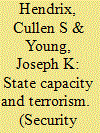| Srl | Item |
| 1 |
ID:
132394


|
|
|
|
|
| Publication |
2014.
|
| Summary/Abstract |
Conventional wisdom suggests that dissident groups use terrorism when they face an overwhelmingly more powerful state, yet attacks in developing countries have predominated in the post-Cold War era, suggesting that terrorism is an increasingly weak state phenomenon. Cross-national studies of terrorism find mixed results for how common measures of state capacity influence terrorism. We argue that these indeterminate findings are due in part to a partial understanding of both what constitutes state capacity and how different aspects of state strength or weakness relate to the propensity of groups to use terrorism. We decompose state capacity into two dimensions that we theorize are particularly relevant to dissident groups: military capacity, or the ability to project conventional military force, and bureaucratic/administrative capacity. Our analysis supports the claim that terrorist attacks are more frequently targeted at states with large, technologically sophisticated militaries but less frequently targeted at states with higher bureaucratic and administrative capacity. We also compare two militarily capable states, France and Russia, that have had different recent experiences with terrorism to help illustrate the causal mechanisms involved. Evidence from our models and cases suggest that states can be capable in different ways, and these various capabilities create differing incentives for using terror as a strategic and tactical tool.
|
|
|
|
|
|
|
|
|
|
|
|
|
|
|
|
| 2 |
ID:
184718


|
|
|
|
|
| Summary/Abstract |
This article explores how the Chinese government aims to maintain social stability by encouraging citizens to become volunteers. We propose that a new type of governance, namely, “state-enlisted voluntarism,” is being deployed in which public security volunteers are mobilized and monitored by the state. Analysis based on ten-year nationwide empirical data gathered from local areas in China suggests that the government intentionally enlists citizens into its hierarchical system to strengthen its administrative capacity and maintain a stable society without the risk of domestic threats. We find that direct enlistment approaches empower citizens as state proxies, and that indirect enlistment approaches ensure that various social stakeholders are comprehensively controlled. In general, the Chinese government has four reasons to institutionalize the state enlistment of voluntarism: to increase human resources at the grassroots; transform social organizations into subordinates; frame policy innovations as political credits; and to avoid blame. Our findings also suggest that China's party-state system mobilizes citizens into implementation-oriented activities rather than engages them in policymaking to maintain social stability at the grassroots.
|
|
|
|
|
|
|
|
|
|
|
|
|
|
|
|